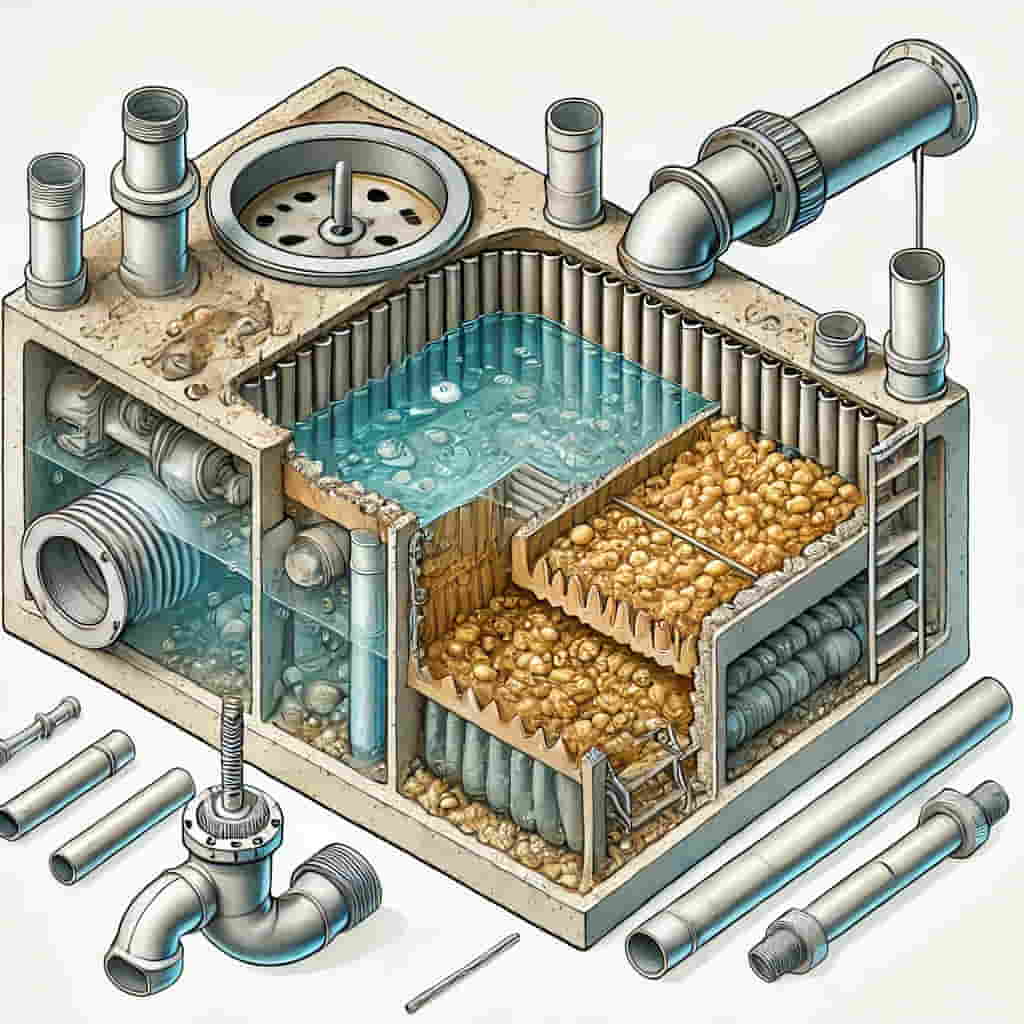How to Choose the Right Grease Trap for Your Business
In the bustling food and hospitality industry, efficiency is everything. One crucial yet often overlooked aspect of maintaining a smooth operation is choosing the right grease trap for your business. With the proper setup, a grease trap can prevent clogs, improve kitchen flow, and keep you in compliance with local health and safety regulations. But here’s the catch: not all grease traps are created equal, and the best choice often depends on the unique needs of your business. So, what exactly should you consider when looking for a reliable grease trap service near me?
This guide dives into different types of grease traps, factors to weigh when choosing one, and practical tips on keeping your grease trap in peak condition. By the end, you’ll have a clear path to finding the best solution for your business.
Types of Grease Traps: An Overview
When it comes to grease traps, choosing the right type can make a world of difference. Let’s break down three main options and how they serve different needs.
1. Passive Grease Traps
- What They Are: Passive grease traps are small, often tank-like units installed beneath sinks or in floor drains. They separate grease and solids from wastewater by allowing them to float to the top.
- Pros: Affordable and relatively easy to install. Ideal for smaller kitchens or businesses with minimal grease output.
- Cons: These traps require regular manual cleaning to function effectively. If neglected, they can lead to blockages, odor issues, and even fines from health inspectors.
- Best For: Small cafes, bakeries, or food service businesses with low-to-moderate kitchen activity.
2. Automatic Grease Removal Units (AGRU)
- What They Are: Unlike passive traps, AGRUs automatically separate and remove grease from wastewater. They have a motorized skimming feature that collects the grease in a separate container, reducing the need for frequent manual cleaning.
- Pros: Highly effective and reliable, making them a favorite among medium-sized to larger kitchens. Their automatic features mean fewer maintenance hassles.
- Cons: Higher upfront costs and more complex installation requirements. They also require regular maintenance checks to ensure the skimming mechanism functions correctly.
- Best For: Medium to large kitchens, including bustling restaurants and hotels with a steady flow of greasy wastewater.
3. Grease Interceptors
- What They Are: Grease interceptors are large, often outdoor tanks designed for high-volume operations. They trap grease through gravity separation, allowing large particles to settle at the bottom while grease floats to the top.
- Pros: High capacity, able to handle large volumes, and require less frequent cleaning than passive traps.
- Cons: Expensive to install and maintain, and they need a dedicated outdoor space. Cleaning and emptying interceptors is typically a job for professionals.
- Best For: High-capacity kitchens in hotels, large restaurants, or food processing facilities. For businesses needing a grease interceptor service nearby, this option provides powerful support for high-volume operations.
Factors to Consider When Choosing a Grease Trap
Once you’re familiar with the types of grease traps, the next step is to consider which one best suits your business’s unique needs. Here are the primary factors to keep in mind:
1. Business Size and Kitchen Load
- Why It Matters: The volume of grease your business generates directly impacts the type of grease trap you need. Small cafes with limited kitchen operations might do well with a passive trap, while a large hotel or catering service would require a grease interceptor.
- How to Decide: Assess the number of sinks, dishwashers, and fryers in your kitchen. A professional can help estimate the load and suggest the appropriate size and type of grease trap.
2. Local Regulations and Compliance
- Why It Matters: Different cities and states have specific regulations on grease trap installation and maintenance. Failing to comply can lead to fines, closures, or worse—environmental damage.
- How to Stay Compliant: Reach out to your local health or environmental department for guidelines. Many areas require specific cleaning frequencies, maintenance records, and even certifications for grease trap service providers.
3. Maintenance Needs and Frequency
- Why It Matters: Each type of grease trap has its own maintenance needs. Passive traps demand frequent manual cleaning, whereas AGRUs automate much of the work. However, regular inspections and occasional professional cleanings are still essential.
- How to Stay on Top of Maintenance: Schedule regular cleanings based on your grease trap type and kitchen activity level. Reliable grease trap service near me providers often offer maintenance schedules and record-keeping to simplify compliance.
4. Installation Costs and Long-term Value
- Why It Matters: A low-cost option might look tempting initially, but a high-maintenance trap could end up costing more in the long run. In contrast, a more expensive AGRU could pay off by reducing labor and potential fines.
- Balancing Costs: Evaluate installation costs against long-term maintenance expenses. Investing in a robust, lower-maintenance unit could save you in operational costs over time.
Illustrative Scenarios: Choosing the Right Grease Trap for Your Business
To bring these points to life, here are two fictional scenarios showing how different businesses might choose their ideal grease trap:
Example 1: Small Café with Limited Kitchen Load
A cozy café, known for its sandwiches and pastries, has a small kitchen with a couple of sinks and a single fryer. Their kitchen generates a modest amount of grease, making a passive grease trap a practical choice. Regular cleaning by staff keeps the grease trap efficient, and they remain in compliance with minimal costs. Partnering with a grease trap service near me ensures that their maintenance needs are met on time and without hassle.
Example 2: Large Commercial Kitchen in a Hotel
A bustling hotel kitchen with multiple sinks, industrial fryers, and dishwashers needs a solution that can handle heavy grease output. An AGRU or a grease interceptor would serve this high-demand environment well. The automatic skimming function of an AGRU reduces cleaning requirements, making it a perfect match for a high-volume kitchen that values both efficiency and reliability. For such a setup, the hotel finds value in locating a grease interceptor service nearby that can quickly respond to any urgent needs.
Finding and Choosing a Reliable Grease Trap Service Provider
The right grease trap is only as effective as the service keeping it maintained. Here’s how to identify a dependable service provider in your area:
Evaluating Service Options
- Look for providers who offer comprehensive services—from installation to regular maintenance.
- Check if the provider is familiar with local regulations. A service provider that’s well-versed in your city’s compliance rules will help ensure you avoid fines and operational interruptions.
- Consider their experience with different grease trap types and sizes. A provider accustomed to high-volume grease interceptors may be more equipped to handle complex setups than one who primarily serves smaller businesses.
Importance of Proximity
- Local providers can respond faster in emergencies. If a backup occurs, a nearby provider can reach you promptly to prevent further disruption.
- Local services often have insights into city regulations, allowing them to provide tailored advice.
Checklist for Service Provider Selection
- Are they experienced with your type of grease trap?
- Do they offer transparent pricing and no hidden fees?
- Can they provide references or testimonials?
- How fast is their emergency response time?
- Do they help with record-keeping and documentation for compliance?
Maintenance Best Practices for Your Grease Trap
A well-maintained grease trap extends its life and keeps your kitchen flowing smoothly. Here’s a quick guide to help you stay on top of maintenance:
Regular Cleaning
Regular cleaning is crucial, particularly for passive traps. Schedule routine cleanings to prevent clogs and unpleasant odors. Keeping up with cleaning not only helps with efficiency but also aligns with FOG (fats, oils, grease) disposal regulations that often require businesses to ensure their grease is properly removed and disposed of according to local environmental standards.
Preventing Grease Buildup
Beyond regular cleanings, certain practices can reduce the amount of grease that makes it into your traps. Use screens in sink drains to catch solid waste, and avoid pouring fats or oils directly into sinks. Educate staff on proper grease disposal practices, as simple habits like wiping down greasy utensils before washing can go a long way in preventing buildup.
Enzyme Additives for Efficiency
Enzyme additives are a smart option for breaking down grease and helping maintain trap efficiency between professional cleanings. These additives introduce beneficial bacteria that digest fats, oils, and grease, helping to keep your trap cleaner for longer. However, consult with a professional before using enzyme additives to ensure compatibility with your grease trap model and to avoid potential clogging issues.
Professional Inspections
While routine cleaning can be handled in-house for some traps, professional inspections are key for all types. They can spot issues that might lead to costly repairs down the line.
Record-Keeping for Compliance
Stay compliant by keeping detailed records of all grease trap cleanings and inspections. Many service providers offer record-keeping services, which can be a huge help if you’re ever audited or inspected.
Conclusion
Choosing the right grease trap is more than just a compliance check; it’s an investment in your business’s smooth operations, cost-efficiency, and brand reputation. By evaluating your kitchen’s needs, understanding local regulations, and finding a reliable grease trap service near me, you can ensure a hassle-free setup and long-term peace of mind.
Looking for more guidance? Reach out to a local grease trap expert who can help you choose the right trap and keep it running at peak efficiency. Investing in the right solution today can mean fewer headaches and greater efficiency for your business tomorrow.
Boost Your Brand with DTF Printing: A Cost-Effective Branding Solution for Small Businesses
In the competitive world of small businesses, making a memorable impression is crucial. Direct to Film (DTF) printing is emerging as a game-changing technology that can elevate your branding efforts without breaking the bank.
What is DTF Printing?
DTF printing is a modern printing technique that transfers vibrant, high-resolution designs onto various surfaces using a heat press. This method offers exceptional versatility, allowing you to create branded merchandise ranging from apparel to ceramics. While it’s incredibly versatile, it’s primarily used on fabrics and certain hard surfaces like ceramics, not typically on metals.
Why DTF Printing is a Game-Changer
Versatility
DTF printing works seamlessly on fabrics, ceramics, and certain hard surfaces, enabling you to create a wide range of branded products. Imagine your brand’s logo on everything from T-shirts to mugs, each item reinforcing your brand identity. If you’ve been searching for “DTF printing near me,” you’ll find many local providers ready to bring your vision to life.
High-Quality Output
When it comes to making a lasting impression, quality matters. DTF printing provides high-resolution images with vibrant colors and sharp details, ensuring your brand’s logo or any other design element looks professional and eye-catching.
Durability
DTF prints are resistant to washing and wear, ensuring your branding materials last longer. While they are durable, it’s important to note that prolonged exposure to direct sunlight can cause some fading over time.
The Small Business Advantage
As a small business owner, you’re always looking for ways to maximize your investment. DTF printing offers a cost-effective solution that doesn’t compromise on quality. Here’s how:
Cost-Effective for Small Runs
Traditional printing methods often require large runs to be cost-effective, which can be prohibitive for small businesses. DTF printing, however, is cost-efficient even for small quantities. This allows you to order smaller batches of customized items without breaking the bank. When you search for “DTF printing near me,” you’ll likely find many providers who offer flexible order sizes.
Fast Turnaround
Time is money, especially for small businesses. DTF printing offers quick turnaround times, so you can respond swiftly to market demands, seasonal trends, or special events. Need a batch of branded merchandise for a local fair? DTF printing can make it happen in no time.
Customization Flexibility
In today’s market, personalization is key. DTF printing makes it easy to customize each item, whether it’s adding a customer’s name to a product or creating limited edition designs. This level of customization can enhance customer loyalty and make your brand more memorable. Searching for “direct to film printing near me” can help you find providers who specialize in personalized printing solutions.
Real-World Success Stories
Let’s dive into a couple of real-world examples to illustrate how DTF printing has transformed small businesses.
Case Study 1: The Boutique Coffee Shop
A small coffee shop in Portland was looking for a unique way to enhance their brand. They wanted to create custom merchandise like T-shirts, mugs, and tote bags that their loyal customers would love. They turned to a local provider after searching “DTF printing near me” and were blown away by the results. The vibrant, durable prints not only boosted their brand visibility but also became a significant revenue stream as customers bought the merchandise as gifts. Remarkably, they saw a 25% increase in merchandise sales within just a few months.
Case Study 2: The Indie Clothing Brand
An indie clothing brand in Austin was struggling with high costs and limited design options using traditional screen printing. They switched to DTF printing and saw immediate benefits. While DTF is better suited for bold designs rather than intricate artwork, the brand still managed to create stunning products that stood out in a crowded market. Their new collection, featuring vibrant and bold designs, received rave reviews, and sales skyrocketed. They also reduced production costs by 15%, allowing them to allocate more budget towards marketing and expanding their product line.
How to Get Started with DTF Printing
So, you’re convinced that DTF printing is the way to go. What’s next? Here are some steps to get you started:
- Find a Reliable Provider Start by searching “DTF printing near me” to find local providers. Check reviews, ask for samples, and compare prices to ensure you’re getting the best quality and value.
- Prepare Your Designs Work with a graphic designer to create high-resolution designs that reflect your brand’s identity. DTF printing can handle intricate details, so don’t be afraid to get creative!
- Choose Your Products Decide on the types of products you want to brand. Consider starting with a mix of items, such as apparel, accessories, and promotional materials, to see what resonates best with your customers.
- Place Your Order Once you’ve chosen a provider and finalized your designs, place your order. Start with a small batch to test the waters and gather feedback from your customers.
- Promote Your New Products Use social media, email newsletters, and in-store displays to promote your new branded merchandise. Highlight the quality and uniqueness of the items to attract attention.
Final Thoughts
In the competitive landscape of small businesses, effective branding can make all the difference. DTF printing offers a versatile, high-quality, and cost-effective solution for creating eye-catching branded materials. By leveraging this technology, you can enhance your brand’s visibility, engage your customers, and ultimately, boost your bottom line.
Whether you’re a boutique coffee shop, an indie clothing brand, or any other type of small business, the benefits of DTF printing are clear. So, go ahead—search for “DTF printing near me,” find a reliable provider, and take your branding to the next level. Your business deserves to shine, and with DTF printing, it will.
Common Mistakes to Avoid When Cleaning Your Grease Trap: A Guide for Business Owners
Running a business, especially one in the food service industry, comes with its own unique set of challenges. Among them is the not-so-glamorous but absolutely essential task of grease trap maintenance. Whether you’re managing a bustling restaurant, a cozy café, or a trendy food truck, ensuring your grease trap is clean and functioning properly is crucial. However, many business owners stumble into common pitfalls when it comes to grease trap cleaning. Let’s dive into these mistakes and how to avoid them, along with some tips on choosing the right grease trap cleaning service.
Mistake 1: Neglecting Regular Maintenance
Imagine your grease trap as a dental hygiene regimen for your kitchen’s plumbing. You wouldn’t skip brushing your teeth for months, right? Similarly, neglecting regular maintenance for your grease trap can lead to serious problems. Grease traps are designed to capture fats, oils, and grease (FOG) before they enter the wastewater system. Over time, FOG accumulates, and if not cleaned regularly, it can cause blockages, foul odors, and even costly repairs.
Solution: Schedule Routine Cleanings
Create a maintenance schedule based on the volume of your business. High-traffic kitchens might need monthly cleanings, while smaller establishments could manage with quarterly appointments. Consistent maintenance not only keeps your grease trap functioning but also extends its lifespan.
Mistake 2: DIY Cleaning Without Proper Knowledge
Sure, the DIY spirit is admirable, but when it comes to grease traps, a little knowledge can be dangerous. Cleaning a grease trap involves more than just scooping out the grease. If not done correctly, it can lead to health hazards, environmental issues, and potential fines from regulatory bodies.
Solution: Leave It to the Professionals
Hiring a professional grease trap cleaning service ensures the job is done thoroughly and safely. These experts are trained in handling hazardous waste and disposing of it according to local regulations. Plus, they have the right tools and experience to keep your system in top shape.
Mistake 3: Using Harsh Chemicals
It might be tempting to use powerful chemicals to clean your grease trap quickly. However, harsh chemicals can corrode your plumbing, damage the trap, and harm the environment.
Solution: Opt for Eco-Friendly Cleaning Solutions
Professional cleaners often use environmentally friendly products that are effective and safe for your plumbing. These solutions break down FOG without causing harm to the environment or your equipment.
Mistake 4: Overlooking the Importance of Documentation
Keeping records of your grease trap maintenance might seem tedious, but it’s a crucial aspect of compliance. Regulatory agencies require businesses to document their grease trap cleaning schedules and methods.
Solution: Maintain Detailed Records
Every time your grease trap is cleaned, ensure you get a detailed report from the cleaning service. This should include the date, method, and volume of waste removed. These records not only help you stay compliant but also provide valuable insights into your grease trap’s performance over time.
Choosing the Right Grease Trap Cleaning Service
Now that we’ve covered common mistakes, let’s talk about how to choose the right grease trap cleaning service. Your choice can make a significant difference in the efficiency and longevity of your system.
Look for Experience and Expertise
When it comes to grease trap cleaning, experience matters. Look for a service provider with a proven track record in the industry. Experienced professionals are likely to be more efficient and knowledgeable about the best practices and latest technologies in grease trap maintenance.
Check for Proper Licensing and Insurance
Ensure the cleaning service you choose is properly licensed and insured. This protects you from any liability in case of accidents or damages during the cleaning process. A reputable company will have no issue providing proof of their credentials.
Read Reviews and Ask for References
In the digital age, online reviews are a valuable resource. Check out what other business owners are saying about the service. Additionally, don’t hesitate to ask the company for references. Speaking directly to other clients can give you a better sense of the company’s reliability and quality of service.
Assess Their Customer Service
Customer service is a reflection of how a company values its clients. Choose a grease trap cleaning service that is responsive, professional, and willing to answer all your questions. Good communication is key to a successful business relationship.
Inquire About Their Disposal Methods
Proper disposal of grease trap waste is crucial for environmental compliance. Ask potential service providers how they handle the waste. Reputable companies should have a clear process for disposing of FOG in an environmentally responsible manner.
Final Thoughts
Grease trap maintenance might not be the most glamorous aspect of running a business, but it’s undeniably important. By avoiding common mistakes and choosing a reliable grease trap cleaning service, you can ensure your kitchen runs smoothly, remains compliant with regulations, and minimizes environmental impact. Remember, a well-maintained grease trap is a small investment that can save you significant headaches and costs in the long run.
So, next time you’re scheduling maintenance or considering a new cleaning service, keep these tips in mind. Your grease trap (and your plumbing) will thank you! And who knows, maybe you’ll even find a bit of pride in this unsung hero of your kitchen’s ecosystem. Cheers to clean pipes and hassle-free business operations!
Commercial Grease Traps: Understanding Their Role in Kitchen Plumbing
In the bustling world of restaurant ownership, maintaining a smoothly running kitchen is paramount to success. Among the many considerations in kitchen maintenance, ensuring the proper functioning of plumbing systems is crucial. Commercial grease traps play a vital role in this regard, yet their significance is often overlooked or misunderstood. In this comprehensive guide, we will delve into the importance of commercial grease traps in kitchen plumbing, their operation, maintenance requirements, and the consequences of neglecting them.
The Purpose of Commercial Grease Traps
Commercial grease traps, also known as grease interceptors or grease separators, are essential components of kitchen plumbing systems. Their primary function is to capture fats, oils, and grease (commonly referred to as FOG) along with solid food particles before they enter the wastewater disposal system. This prevents FOG from accumulating in sewer lines and causing blockages, backups, and environmental contamination. By intercepting grease at the source, grease traps help maintain the integrity and efficiency of municipal sewage systems while mitigating the risk of costly plumbing emergencies.
How Commercial Grease Traps Work
Commercial grease traps operate on a simple yet effective principle of gravity and buoyancy. As wastewater flows through the grease trap, it first encounters a baffle or separator that slows down the flow. This allows FOG and solid particles to separate from the water due to differences in density. FOG, being lighter than water, floats to the surface, forming a layer of scum, while solid particles settle at the bottom. The relatively cleaner water flows through the trap and exits into the sewage system. To prevent overflow, grease traps are equipped with a device called a skimming mechanism or an automatic grease removal system, which periodically removes accumulated grease from the surface.
Importance of Regular Maintenance and Cleaning
While commercial grease traps are effective in capturing FOG and solid waste, they require regular maintenance and cleaning to remain efficient. Neglecting proper maintenance can lead to a myriad of problems, including foul odors, clogged pipes, sewage backups, and compliance violations. To ensure optimal performance, grease traps should be inspected, cleaned, and serviced by trained professionals on a routine basis. Commercial grease trap cleaning involves removing accumulated grease, solids, and debris from the trap, as well as inspecting and repairing any damaged components. Regular cleaning not only prevents plumbing emergencies but also prolongs the lifespan of grease traps, saving restaurant owners from costly repairs and replacements.
Regulatory Compliance and Environmental Responsibility
In addition to the operational benefits, proper maintenance of commercial grease traps is essential for regulatory compliance and environmental responsibility. Many municipalities and regulatory agencies have strict guidelines and regulations governing the installation, operation, and maintenance of grease traps in commercial kitchens. Failure to comply with these regulations can result in fines, penalties, and even legal action. By adhering to regulatory standards and implementing best practices for grease trap maintenance, restaurant owners demonstrate their commitment to environmental stewardship and community health.
The Consequences of Neglecting Commercial Grease Traps
The consequences of neglecting commercial grease traps can be severe and far-reaching. Accumulated grease and solid waste can lead to blockages in sewer lines, causing backups and overflows that disrupt kitchen operations and pose health hazards. In addition to the immediate impact on restaurant operations, sewage backups can result in costly property damage, cleanup expenses, and reputational harm. Moreover, untreated FOG discharged into the environment can pollute waterways, harm aquatic life, and degrade ecosystems. By proactively addressing grease trap maintenance, restaurant owners can mitigate these risks and safeguard their business, the environment, and public health.
Conclusion
Commercial grease traps play a critical role in maintaining the efficiency and integrity of kitchen plumbing systems in restaurants. By intercepting fats, oils, grease, and solid waste, grease traps prevent blockages, backups, and environmental contamination. However, to ensure optimal performance, grease traps require regular maintenance and cleaning. Restaurant owners should prioritize grease trap cleaning as part of their routine maintenance schedule to avoid plumbing emergencies, regulatory violations, and environmental harm. By investing in proper maintenance, restaurant owners can protect their businesses, comply with regulations, and demonstrate environmental responsibility. Commercial grease trap cleaning is not just a necessity; it is an essential aspect of running a successful and sustainable restaurant operation. Click here to learn more.
Breaking Barriers: The Crucial Role of Disability Discrimination Lawyers in the Workplace
In the quest for a more inclusive and equitable society, the fight against disability discrimination in the workplace has gained significant momentum. At the forefront of this battle are disability discrimination lawyers, individuals dedicated to breaking down barriers and ensuring that every individual, regardless of ability, is treated fairly in the professional realm. In this article, we delve into the pivotal role played by these legal professionals and explore the impact they have on fostering a more inclusive work environment.
Understanding Disability Discrimination:
Disability discrimination refers to the unfair or prejudicial treatment of individuals based on their physical or mental impairments. In the workplace, this can manifest in various forms, including biased hiring practices, unequal pay, denial of reasonable accommodations, and even wrongful termination. Recognizing these challenges, disability discrimination lawyers work tirelessly to safeguard the rights of individuals with disabilities, advocating for a workplace that values diversity and inclusivity.
The Legal Framework:
In the United States, several federal laws protect the rights of individuals with disabilities in the workplace. The Americans with Disabilities Act (ADA) is a landmark legislation that prohibits discrimination against individuals with disabilities in various aspects of public life, including employment. Disability discrimination lawyers play a crucial role in ensuring that these legal provisions are not only upheld but also expanded upon to address emerging challenges in the ever-evolving professional landscape.
The Role of Disability Discrimination Lawyers:
Legal Advocacy:
Disability discrimination lawyers serve as advocates for individuals facing discrimination based on their disabilities. They navigate the complex legal landscape, providing counsel to both employees and employers, and work towards resolving disputes through negotiations, mediation, or litigation when necessary.
Educating Employers:
Lawyers specializing in disability discrimination often collaborate with employers to raise awareness about the importance of creating an inclusive workplace. They provide guidance on reasonable accommodations, thereby facilitating a more accessible environment for employees with disabilities.
Navigating Reasonable Accommodations:
The concept of reasonable accommodations is central to ensuring that individuals with disabilities can perform their jobs effectively. Disability discrimination lawyers assist both employers and employees in determining and implementing these accommodations, fostering an environment where everyone can contribute their skills and talents.
Litigation:
When cases of discrimination cannot be resolved through negotiation or alternative dispute resolution methods, disability discrimination lawyers take the matter to court. Through litigation, they seek justice for those who have been unfairly treated, setting legal precedents that further strengthen the protection of disability rights in the workplace.
Policy Advocacy:
Beyond individual cases, disability discrimination lawyers engage in policy advocacy, pushing for legislative changes that enhance the protection of disabled individuals in the workplace. Their efforts contribute to the evolution of legal frameworks that better address emerging challenges.
Accessing Legal Support:
If you or someone you know is facing discrimination based on disability in the workplace, it is essential to seek legal guidance promptly. You may wonder, “Is there a disability discrimination lawyer near me?” Fortunately, there are legal professionals across the United States dedicated to fighting for the rights of individuals with disabilities.
Conclusion:
In the pursuit of a more inclusive society, disability discrimination lawyers play a pivotal role in dismantling barriers and advocating for the rights of individuals with disabilities in the workplace. Their efforts not only ensure justice on an individual level but also contribute to shaping a more equitable and diverse professional landscape. As we continue to break down these barriers, the commitment of disability discrimination lawyers remains instrumental in building a workplace where everyone, regardless of ability, can thrive.

















